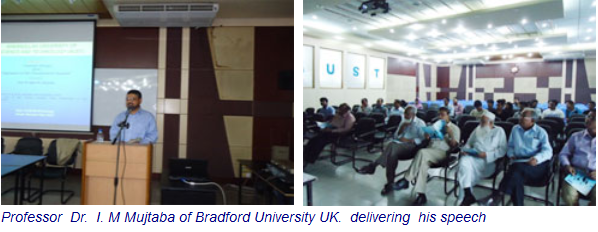Date: 2014-06-15
A seminar on Optimal Design and Operation of RO Desalination System for Making Freshwater was held on 10th june, 2014 at 03: 00 pm in the Seminar Hall of AUST. The seminar was presented by Prof. Dr. Iqbal M. Mustaba, School of Engineering and Informatics, University of Bradford, UK. The Chief Guest of the Seminar was Prof. Dr. A.M.M. Safiullah, Vice-Chancellor of AUST. The seminar was chaired by Prof. Dr. Md. Anwarul Mustafa, Head, Department of Civil Engineering, AUST. Faculty members and the final year students of AUST were present at the seminar.

Prof. Mujtaba is a Prof of Computer Process Engineering in the School of Engineering, at the University of Bradford. He obtained his BSc and MSc Engineering degrees in Chemical Engineering from BUET in 1983 and 1984 respectively and obtained his PhD from Imperial college London in 1989. He is a Fellow of the IChemE, a chartered Chemical Engineer, and a committee member of the IChemE's computer Aidded Process Engineering Subject Group. He was the Chair of the European Committee for Computers in Chemical Engineering Education from 2010-2013.
Prof. Mujtaba encouraged the students for enrollment in Bradford University, UK. He gave some advices to them in his speech and also spoke about the procedure of admission to Bradford University. He also mentioned that Bradford University can be the right platform for those who are willing to acquire knowledge from a reputed University.
Water desalination is vital in the countries suffering from diminishing freshwater resources. Thermal and membrane processes are the major desalination systems in the world..However, recently, the membrane based RO (Reverse Osmosis) market share has significantly increased compared to thermal desalination technologies.
The presentation was divided into two sections. In the first section, the design of reverse osmosis (RO) network for desalination for wide range of salinity and seawater temperature is discussed. starting with a flexible superstructure that contains all possible alternatives of a potential RO network is refined during the synthesis using model based optimization technique. The synthesis problem is posed as to find out an optimal RO network which will minimize the total annualized cost consisting of capital costs (pumping energy, chemicals, maintenance and membrane replacement) while fulfilling a given freshwater demand and quality.
In the second section, both the design and operation optimization of the RO systems considered on a daily basis is discussed.. Short term optimization of RO process on the basis of 24 hours gives high chance to the operators of the RO plant to respond effectively to customer demand. A variable freshwater demand and seawater temperature throughout the day are considered here. Storage tank is added to the process layout to increase the flexibility of the RO operation and to ensure the availability of freshwater at all times. The objective is to minimize the total operation cost in order to meet the variable freshwater demand while optimizing operating variables (feed flow rate, feed pressure) and design parameters (number of membrane main-groups in operation, max 2) at each discrete time period. Also, the violations of the storage tank level and water quality bounds are monitored dynamically and maintained within a specified limit.
In conclusion, the Chairman of the session and Head, Civil Engineering, thanked Prof Mustaba for presenting a very illuminating paper and also thanked all the attendants for their participation.